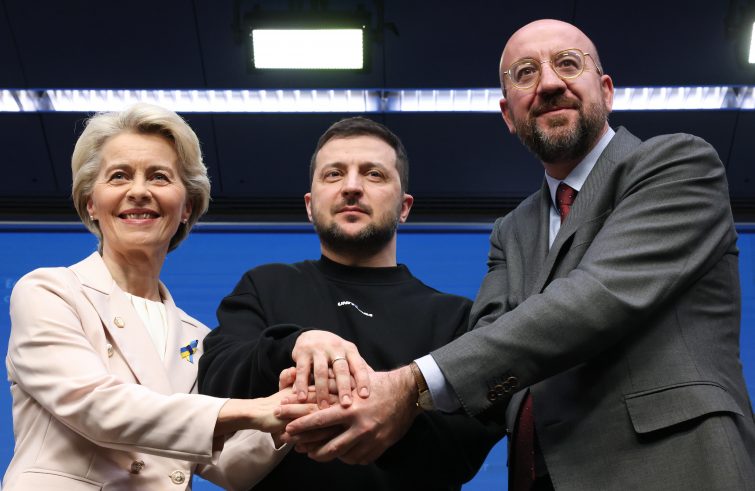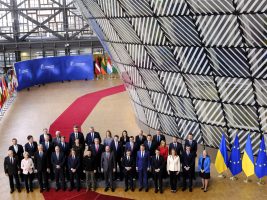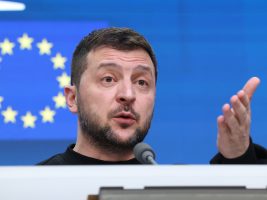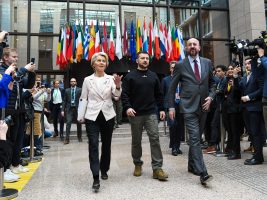
‘Si vis pacem, para bellum’: the ominous, terrible Latin saying would seem to accompany, at this protracted stage, the European Union’s journey alongside Ukraine, whose people are suffering martyrdom at the hands of Putin’s army. Thus, even the European Council, which brings together the 27 Heads of State and Government in Brussels, pledges renewed financial and military support to Kyiv, leaving in the background just a glimpse of the urgent, necessary steps leading to a political and diplomatic peace ( which Moscow has so far turned a deaf ear to).
“Immeasurable suffering and devastation.” The special summit produced a 15-page document released late at night. It lays down the ‘conclusions’ concerning the issues discussed by the national leaders who welcomed Ukrainian President Zelensky at the Council. The chapters focus on Ukraine, the economy, migration, the Belgrade-Pristina dialogue and, last but not least, the earthquakes in Turkey and Syria.
“The European Council reiterates its resolute condemnation of Russia’s war of aggression against Ukraine, which constitutes a manifest violation of the UN Charter.”
Russia’s “brutal war, which has lasted almost a full year, has brought immense suffering and destruction upon Ukraine and its people – state the EU-27 leaders -. Russia must stop this atrocious war immediately. The European Union will stand by Ukraine with steadfast support for as long as it takes.”
Preferential dialogue. Nevertheless, this solemn, unanimous declaration fails to conceal the internal divisions that have once again surfaced in Brussels. Zelensky is asking for additional weapons, and a good number – but not all – of EU countries are prepared to supply them. Zelensky calls for a political dialogue with the EU, and a rapid accession process, yet he seems to prefer dealing with non-EU members (his flight to London before Brussels). And, in his stopover in Paris, he establishes preferential dialogues with some EU countries (France and Germany), whereas others – especially Italy – express resentment claiming they were ‘left out’ of the talks. This is the multi-speed Europe at work, at a time when what is needed is full cohesion and a single voice, a voice that demands peace.
- (Photo European Council)
- (Photo European Council)
- (Photo European Council)
Sanctions and stop to natural gas. “The European Union’s support for Ukraine’s independence, sovereignty and territorial integrity within its internationally recognised borders and its inherent right of self-defence against the Russian aggression remains unwavering,” reads the document released by the European Council. The European Union, it states, “will maintain and seek to further increase, in consultation with international partners, collective pressure on Russia to end its war of aggression and to withdraw its troops and military equipment from Ukraine.” Sanctions and Europe’s reduced consumption of Russian natural gas and oil will also continue, thereby depleting the coffers of Putin’s regime.
Ten-point plan and a summit. At last, a paragraph specifically dedicated to peace: “The European Council reiterates the European Union’s readiness to support Ukraine’s initiative for a just peace based on respect for Ukraine’s sovereignty and territorial integrity.” To date, Russia “has not shown any genuine willingness regarding a fair and sustainable peace.” The European Council “expresses its support for the peace formula of President Zelenskyy and reaffirms the European Union’s commitment to work actively with Ukraine on the 10-point peace plan.”
The European Union “supports the idea of a Peace Formula Summit aiming at launching its implementation.”
This statement is followed by additional promises regarding Ukraine’s future EU membership and continued humanitarian aid to Kyiv – with a considerable and generous effort – before returning to pledge weapons, perhaps even fighter jets, for a war in the sky.
Weapons and soldiers. “The European Union will continue to provide strong political, economic, military, financial and humanitarian support to Ukraine and its people for as long as it takes.” Overall assistance to Ukraine and its people by the European Union and its Member States “so far amounts to at least EUR 67 billion.” The European Union, the document states, “has approved a seventh tranche of EUR 500 million in military support to Ukraine under the European Peace Facility and launched the EU Military Assistance Mission to train an initial 30 000 soldiers in 2023.” This brings the total military support from the European Union and its Member States “to nearly EUR 12 billion.” Billions of Euros, and armaments and soldiers to wage war.
Money to build walls. There were no new developments concerning the phenomenon of migration, except for the Central and Eastern European countries’ determination to erect walls. They say ‘yes’ to building walls but say ‘no’ to creating a common migration policy under the banner of solidarity with the first asylum countries across the Mediterranean. This is the outcome achieved by the Italian government, yet once again.
In fact, the European Council outlines “more effective control of EU external borders” and repatriations. Little mention is made of dialogue with the countries of departure and transit of immigration flows.
There is even a reminder to the Commission to fund “measures by Member States that directly contribute to the control of the EU external borders”: that is, to finance the building of walls and barbed wire with European citizens’ money.
Providing relief for Turkey and Syria. Finally, the Council calls for an agreement between Serbia and Kosovo in the framework of the stabilisation of the Balkans, and pledges aids to the earthquake victims in Turkey and Syria: more than twenty thousand people killed in the earthquake have succeeded in uniting the Member States around solidarity and aid. Meanwhile, political squabbles remain in the background, the long faces exchanged between Meloni and Macron, the umpteenth summit where the Union has failed to agree on a common approach to the major global challenges that lie ahead and that require a Union that is finally united.












